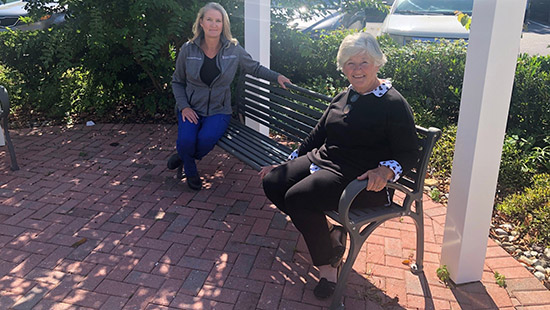Nutrition and Lifestyle Changes Help Reduce Breast Cancer Risk, Recurrence

Nutritionist Christine Allen, left, and Nurse Navigator Margot Spies are shown outside UM Shore Regional Health’s Clark Comprehensive Breast Center.
Breast cancer patients and those who are at high risk for developing breast cancer can include nutrition and lifestyle changes in their journey towards wellness, thanks to the team of specialists in the Cancer Program at UM Shore Regional Health.
"We join the American Institute of Cancer Research (AICR) in highlighting the importance of lifestyle and nutrition choices in breast cancer prevention and survivorship," said Margot Spies, Survivorship Nurse Navigator for the Cancer Program. "We share their mission to champion the world's latest and most authoritative scientific research on cancer prevention and survival through diet—and also physical activity—so that we can help people make informed lifestyle choices to reduce their risk of cancer or cancer recurrence."
AICR recommends a plant based, whole food diet that also includes vegetables, fruits, whole grains, legumes, nuts and seeds. Lean protein such as dairy, meats, poultry, seafood and eggs are included. Through its website (https://www.aicr.org/cancer-prevention/), AICR offers a 10-week interactive program, created by registered dietitians, to help cancer patients improve their diet and healthy habits.
According to Christine Allen, Clinical Nutrition Manager for UM Shore Regional Health, well-documented research shows the role that nutrition and lifestyle play in reducing the risk of breast cancer as well as other types of cancer, and also in preventing recurrence. "Healthier choices to help prevent cancer include following a more plant-based diet, avoiding processed meats and limiting the consumption of alcohol, red meats and high sodium foods. Most important, 30 minutes of physical activity each day is needed to support better health."
The American Cancer Society makes similar recommendations, including consuming fewer sweets that promote weight gain. Research shows that for women, being overweight or obese after menopause increases the risk of breast cancer. One reason is that having more fat tissue can by raising estrogen levels, which increases risk. Also, women who are overweight tend to have higher levels of insulin, which is linked to breast cancer as well as to other types of cancer.
"It is extremely important to work towards or maintain your ideal weight when it comes to reducing your risk for breast and other cancers, as well as other serious diseases," said Spies. "You are never too old or unfit to start a physical activity routine, even if you have never entered a gym or exercise program."
Breast cancer patients who have completed treatment can find the physical activity needed to support their wellness through programs like the YMCA of the Chesapeake's LiveSTRONG Program, a 12-week program for adult cancer survivors that meets twice a week at the Washington Street Y in Easton. YMCA wellness coaches work with each participant to tailor the program to their individual needs, with instructors who have been trained in aspects of cancer treatment and side-effects, post-rehabilitation exercise, and supportive cancer care. In addition to the physical benefits, the program provides participants a positive environment and a feeling of community with fellow survivors.
Patients can participate in LiveSTRONG at no cost, thanks to a Maryland Rural Health Grant with the YMCA.
